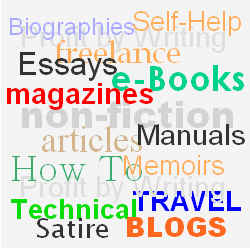
Are you fiction writer? A non-fiction writer? Or both?
If you truly love writing, want to make a regular income from it (or you are already making a living writing) and/or can’t wait to share what you have learned and experienced with the rest of the writers out there, chances are, you are both into writing fiction and non-fiction.
Stephen King wrote a book on writing, simply called On Writing: A Memoir of the Craft. Now, that’s the kind of writer I want to learn from. Not because I’m a horror fan, but because I admire his success, productivity and ability to write in diverse genres (Shawshank Redemption, for instance, is based on a story of his) and write in a variety of formats (novels, short stories, non-fiction books…)
Screenwriter John August (Big Fish, Go, Charlie’s Angels, Dark Shadows) runs a website where he shares his tips on screenwriting – one of my favorite go-to resources as an aspiring screenwriter.
Some novelists get to adapt their movies to screen themselves and writing magazines love publishing advice articles from published writers. Stephen Chbosky’s The Perks of Being a Wallflower, anyone?
I love writing fiction and non-fiction, and wrote about why we needed to balance the two here before.
But sometimes, one takes priority over the other, usually because of deadlines and where your productivity is gravitating towards at that moment.
For the last couple of months, even though I did my best not to neglect my blogs, I’ve concentrated polishing my screenplay and a TV pilot for competitions. I read even more about formatting, selling, contests’ reliability. I found great resources on both writing and selling, and I’ll be sharing them here soon.
But it’s safe to say I was lost in a world of fictional characters and story lines, and reading up on how to make them come alive.
Of course my non-fiction ideas didn’t stop flowing. So I noted them down, and after having taken care of 3 competitions with the nearest deadlines, I’m ready to immerse in non-fiction once again.
Getting back to real life is fun, though your mind and writing might take a while to adjust. So below are a few tips to make the transition easier and quicker:
1) Go through your old ideas. Having worked on different projects might have provided you new insights and angles. Use them. Brainstorm with your just-back-from-fiction mind. You might be surprised.
2) Keep writing new ideas down. Also make a note of what you have learned about writing/selling fiction. There are a million stories there.
3) Not getting hit by a new load of ideas? This post is bound to ignite some quality inspiration: Finding Article Ideas & Writing About Them: 30 Inspiration Tips for Writers.
4) Check the websites/publications you follow, including the ones you have written for or wanted to write for. They might have gone through editorial changes. Their submission guidelines or how they work with freelance writers might have changed. Is this still a place you want to write for? Update your market list accordingly.
5) If those websites are still up your alley, study the new articles. You need to know what they published recently. You don’t want to waste the editor’s time, or yours, by pitching an idea that was recently covered.
6) Do a “markets” research. There are probably new writing markets you might want to catch up on. Make notes of the ones that interest you.
7) Write. It’s like switching between rollerblades and your bike. Both are fun, both are you. They just work a bit differently.
8) Promote your writing. Remind your readers you’re alive and well. Of course this works better if you’ve kept up a presence in the blogosphere during your fiction marathon.
9) Read non-fiction: blogs, magazines, books, twitter feeds of the people that inspire you, entertain you and/or piss you off…new and old stuff. Read.
10) Read some of those awesome e-books you kept for referencing, and some new resources you found. Some of my new favourites came from Sophie Lizard’s Another 52 Free Resources for Freelance Bloggers post, for instance.
11) Keep reading fiction, but don’t make it the priority.
12) Exercise. Seriously. I know how easy it is to get caught up in the wonderfully exciting worlds you have created, but we need to be healthy. And exercising gives you even more ideas.
13) Eat healthily. Yes, you always need to do this, but if you have gone on a binge to make the deadlines, get a grip on your eating habits before your immune system decides to punish you. I’ll be posting about this too, so stay tuned.
*
Welcome back to the lovely world of non-fiction! If there are any tips you’d to add, comment away…